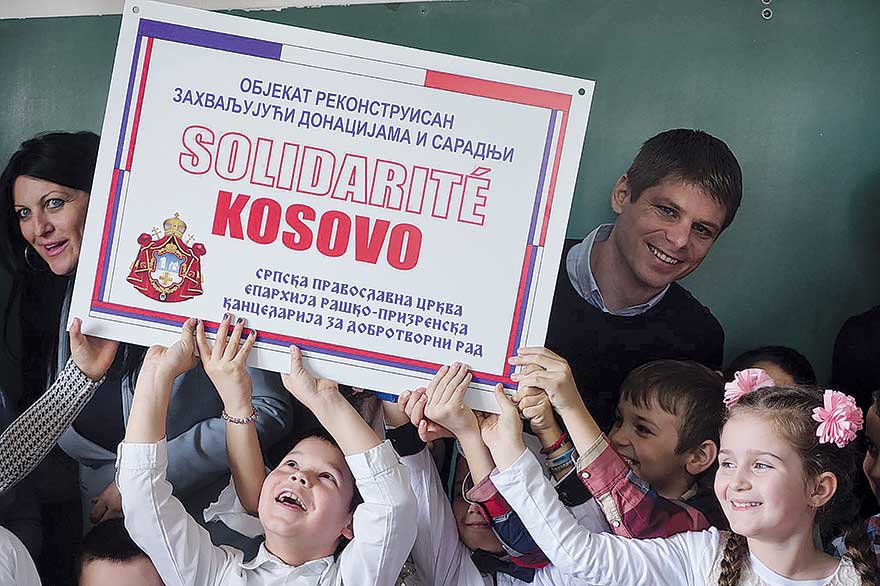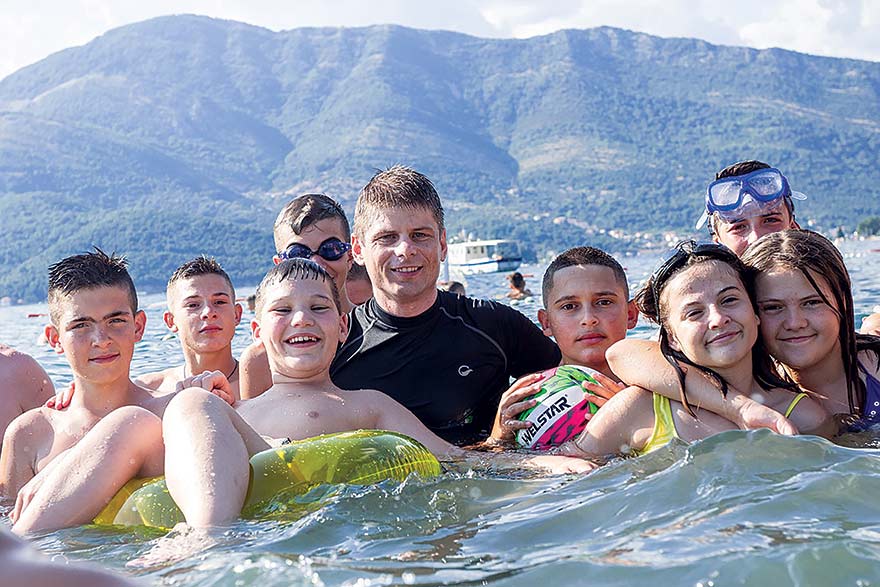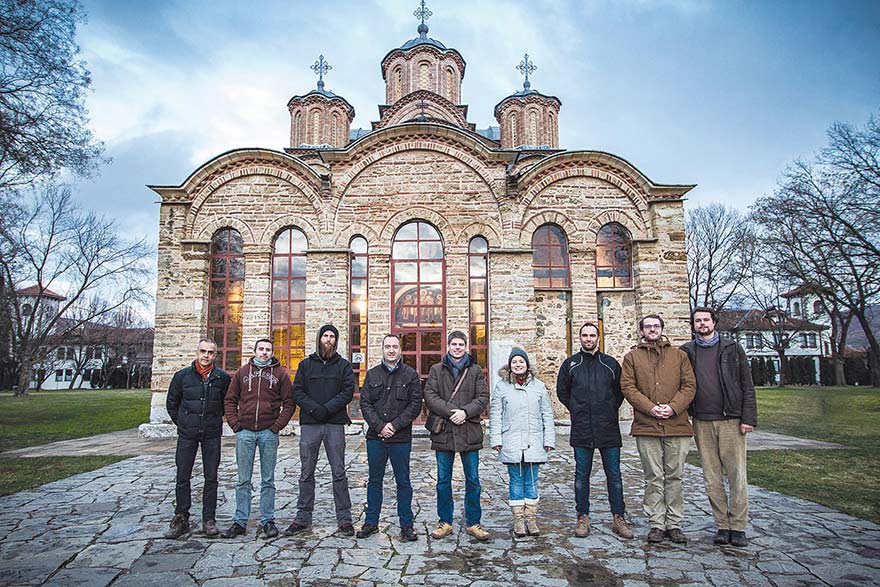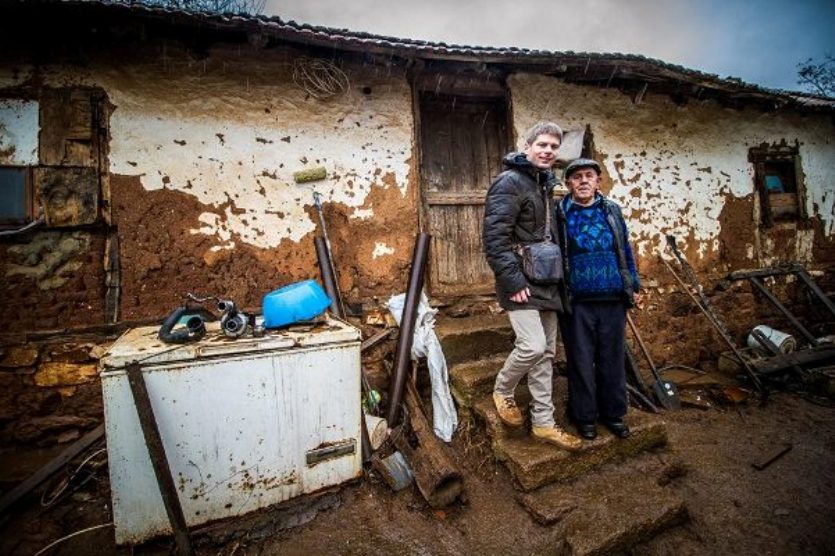He is a Frenchman who was only 13 when he realised that Serbia had suffered great wrongdoing when it was bombed by NATO forces. And it’s no surprise that he founded the humanitarian organisation ‘Solidarity for Kosovo’, which has been helping Serbs for the last 15 years
In this account, he speaks about the upbringing given to him by his parents, the reasons he loves Serbia, what are the beautiful and dark faces of France today, and why he believes in President Macron’s more realistic view of the Balkans and Russia. In its history, Serbia recalls many foreigners who visited it, lived in it, helped it and wrote about it. Today we most often quote what was recorded about Serbs by Rebecca West, Archibald Rice or Peter Handke, while that sovereignty at the beginning of the 21st century belongs to a foreigner who has become a citizen of Serbia, but who is a Frenchman by birth, upbringing and education.
His name is Arnaud Gouillon, and last month, or more precisely on 27th November, he turned 34 years old. He has been living between Serbia and France over the previous ten years, but his address of residence is in Belgrade. He is officially the founder and head of the humanitarian organisation Solidarity for Kosovo, and what he has done for Kosovo has to date been recorded on pages, led to the production of extensive documentary material. In recent days, with the help of this charity, a historical comic book was published in France as a romantic drama called Welcome to Kosovo. Speaking about this project, CorD’s interlocutor explains:
“The story follows the life of young Dimitri, who returned to Kosovo after being a refugee, shortly before the Serb pogrom of 2004. This romanticised drama is composed of real-life events and will show the French public the recent history of the Balkans from a different, less biased perspective. Following books and magazines, documentaries and lectures, this is another step forward, intending to ensure the voice of Serb victims is heard everywhere in the West.”

Who is this charming devotee of the idea of helping the people of Kosovo, especially children? In this story, we attempt to find the right answer to that question.
“I had a happy childhood in a village near Grenoble, in the foothills of the Alps, where I grew up as the youngest of three children. I have an older brother and sister. We had everything we needed in the village where we lived. With a teacher for a mother and a father who was a civil servant for the railways who wrote history books, we were raised strictly and righteously. We didn’t watch television, except on rare occasions during the weekend. Our parents raised us with stories and my wife, and I are trying to do the same with our girls.
When I say that we had everything we needed, that doesn’t also mean that we had everything we wanted. Our parents bought us everything that was essential, and they wouldn’t have bought us everything we wanted even if they could. So they raised us to appreciate the value of what we have. They didn’t turn us into consumers, rather people for whom moral values were above all material values. We learnt not to measure everything in euros, but rather in elevated moral values. Today the average parent can provide their child with sweets and cheap toys made in China, and can satiate their child with various gifts. A child raised in such a way thinks that life means spending, buying, but my parents taught me that life has meaning in categories other than consumer ones.”
If you are open, if you know who you are and where you’re from, then it’s easy to open yourself up to others. Being a French “kin-lover”, I was capable of recognising what is specific about Serbs, and to love and adopt that
CorD interviewer is simply fascinating with his perfect knowledge of the Serbian language, his fine expression, his careful choice of words when he tries to evoke the virtues of his parents, which he tries to recognise in himself or to nurture as much as he can in everyday life. He would like to have his father’s work ethic, which consists of constant reading, writing and thinking. His father’s library is clear evidence of how much he’s read and what he’s done to gather together as much information as he needed to develop a more accurate overview of the world. He would like to have the logical reasoning of his father, who he says is a true intellectual in that sense, because he questions every truth, every claim and looks at everything from multiple angles and logically asks questions, seeking logical answers:
“Thanks to him, we in the family had a different view of Serbia, a different opinion of Serbia when everyone around us had a negative opinion about it. My mother was a counsellor in her district for twenty years, and in France, that’s a demanding job that implies working without privileges on a permanent basis. She’s been very active in her surroundings all her life, in order to help solve the problems of the local population, and I would love to have her heartfelt activity and her passion for public appearances. She is capable of speaking very well in front of an audience. I wish I had that blend of my parents’ virtues.”

As a schoolkid, Arnaud particularly loved mathematics and physics, in which he excelled. He didn’t like art, because in school he didn’t learn to draw but was rather choked by a theme, and he would have to answer questions on that theme. It was more about explaining than creating a work of art, and he primarily wanted to learn the basics of painting, for it to be made clear to him what perspective is, what are the laws of fine arts that one must know. Depending on period and age, his interests and desires of what he wished to be when he grew up changed. He initially wanted to be a police officer and a soldier, but once he started skiing and hiking in the Alps, he decided that he wanted to be a mountain guide. That job was for him synonymous with freedom, adventure and encounters with nature and people:
“I was good at the natural sciences, graduated from engineering school in the field of environmental protection and occupational safety because I wanted my profession to make sense. And protecting nature and people makes sense, you see a tangible contribution.”
In order for the French to understand what life in an enclave means, I describe it like Asterix’s Village, surrounded by barbed wire, from which the inhabitants cannot escape without being exposed to enormous risk, humiliation, insults etc.
Politics always interested him as a very positive vocation, as a way of pursuing the common good. However, unfortunately, people today generally have a negative opinion of politics, which he explains as being for the following reasons:
“That’s because today politics is equated with party politics and politicking. And politics is actually about serious work that I saw with my mother that yields results at the local level and makes sense. Politics is dealt with by people who are dedicated to the common good and don’t work to their own benefit, but rather to the detriment of their personal benefit. As a child, I was always chosen to be my class representative, and in college, I was a student representative. I have long since known that it’s not enough in politics to have ideas, but rather those ideas have to be turned into deeds. Only deeds leave a mark and can influence society to change it for the better.”

Arnaud adores the Serbian word rodoljub [patriot] because its etymology includes the words rod [kin] and ljubav [love.] It means loving your kin, your ancestors, your family, your people and your civilisation. And the world to which we belong. When asked if this word isn’t just a synonym for patriotism, he explains:
“Everything ending in ‘ism’ implies an ideology, and ideologies are by their nature mostly global; they don’t accept reality; instead they try to change it to fit the ideology that they represent. That was seen with communism, with fascism, and today we see it with liberalism. And that’s why there’s no rodoljub-ism because it is not an ideology. There is [in Serbian] patriotism, but not rodoljubizam. Being a ‘kin-lover’ is a state of mind, and one can be a Serb, a Frenchman, an Algerian, a Brazilian and every inhabitant of the planet.”
Interpreting his claim literally, our interviewee can be said to be a ‘kin-lover’ both as a Frenchman and as a Serb, given that he has both French and Serbian citizenship. He says that the Serbs and the French share the achievements of European civilisation and culture and that there isn’t a great gap between the Serbs and the French. He believes that a Serb can feel at home in France, just as he feels at home in Serbia:
“If you are open, if you know who you are and where you’re from, then it’s easy to open yourself up to others. Being a French kin-lover, I was capable of recognising what is specific about Serbs, and to love and adopt that.”
Unfortunately, there is no magic potion for Serbs in Kosovo, so they feel very lonely and isolated. They are the ghettos of the 21st century and I’m sorry that many people don’t want to talk about that
When you meet him, when you talk with him, the realisation that, as a boy of 13, Arnaud was so seriously interested in the fate of Serbs, a nation to which he does not belong, is clearer to you. He informs us that in 1999, during the time of the bombing of Serbia, the propaganda in France was such that everyone had to have an opinion. And the children had to know everything about the bad Serbs because debates were organised in schools:
“Thanks to my family, we had a positive opinion of Serbia and Serbs, because we knew that the Serbs had suffered great injustices. Not all bad guys are on one side, nor are all good guys on the other. Everything isn’t just black or white. We knew that there were strong links between the French and the Serbs from World War I onwards; we knew that King Petar I Karađorđević fought on the side of France against Prussia in 1870. During the bombing, on television, I heard all the worst about the Serbs, and from my father – presumably for the sake of balance – I heard all the best. I knew that we hadn’t done any kind of humanitarian deed by bombing a nation at the heart of Europe. I was a boy at the time, but I recognised that, and it was etched in my memory then that we needed to stand in solidarity with the Serbian people.”
We can easily conclude that Kosovo became his concern after the firebombing and demolitions of churches and monuments of Serbian history in Kosovo in 2004. It was then, after the pogroms committed against the Serb population, that he decided to establish humanitarian organisation Solidarity for Kosovo, in order to do something to alleviate the grief and anger caused by the pogroms and to produce something tangible and useful through positive action.
Setting up such an organisation in France wasn’t the easiest thing to do, but he succeeded:
“There were, of course, also negative reactions from outraged racists who still considered Serbs as being evil and genocidal, and that everything related to Serbia must be negative and bad. There were some who said it was great action regarding humanitarian aid, but they asked why Serbs? Imagine the question ‘why Serbs?’! It is as if Serbs cannot be victims, as if the child victims are not children, but rather Serb children. That wasn’t the demonisation of just a leader, an army, or a regime; it was the demonisation of an entire nation. And they didn’t stop there. That’s the kind of racism that hasn’t been seen in Europe since the end of World War II because it didn’t stop at the demonisation of one nation. They also demonised anyone who stood up for the Serbian people. And this continues, unfortunately, although things are slowly changing for the better. We have succeeded in breaking through the media blackout in France and have more objective articles about Serbia and Kosovo, which was impossible 15 years ago. We showed a documentary film lasting 52 minutes on one French television channel about the situation in Kosovo, and we managed to gather 12,000 donors. It wasn’t easy, but we persevered and succeeded. Perhaps our fight in the Western media is still unequal for us, but justice is on our side, and we will continue as such.”

Despite everything, he never considered giving up on his humanitarian work. He knows that these people – but most of all, children – depend on the help of his organisation. It isn’t only important to them what they get, rather also the fact that some good people are behind them, thinking of them and that they will come to visit them with good intentions and understanding for the difficult life in their enclaves. He has so far organised 45 humanitarian aid convoys bringing more than 500 tonnes of new materials, new clothes, shoes. Every year he brings from France school supplies and sports equipment.
Moreover, together with the Eparchy of Raška and Prizren, various projects are financed in the fields of agriculture, livestock farming and education. Some 34 schools have been renovated. Six farms have been built, one dairy, one factory for pasteurising fruit and vegetables, while help has been provided for the renovating of several churches and monasteries. He is proudest of the farms that they’ve opened because that allows people to live from their work, and not humanitarian aid. They drive the entire area in which they’re located. The total value of total assistance to Kosovo provided by this charity is 5.5 million euros:
“In order for the French to understand what life in an enclave means, I describe it like Asterix’s Village, surrounded by barbed wire, from which the inhabitants cannot escape without being exposed to enormous risk, humiliation, insults etc. Unfortunately, there is no magic potion for Serbs in Kosovo, so they feel very lonely and isolated. They are the ghettos of the 21st century, and I’m sorry that many people don’t want to talk about that.”
Arnaud says he’s glad that the Serbian-French relations are better today than previously, and he hopes that the mistakes made towards Serbia in the past will be understood in France and that Serbia and the Serbian people will again be appreciated in the way that they deserve:
“I have the feeling that French President Emmanuel Macron views the Balkans and Russia more objectively and more realistically, and with less ideology than his predecessors. And that is good because international politics should be approached from a realistic perspective, and not an ideological one.”
With Serbs I’m bothered by the unreliable tardiness that is displayed on a daily basis. Five French minutes usually equate to 30 Serbian minutes, because when someone tells you they’ll see you in five minutes they usually arrive half an hour later. And what directly annoys me in Serbia is negligence regarding the common good
He thinks that he’s taken on some Serb qualities since he’s been living in Serbia, such as the ability to cope with sudden new situations. He initially found it difficult to organise himself here, because he was thinking and working in the French way, and here that isn’t functional and didn’t produce a good result. Today he doesn’t like the French conformism, which results in a lack of courage in every sense:
“People are no longer capable of protecting themselves or their family in a physical sense, and they daren’t say what they think in moral terms. This conformity is reflected in public speaking, at public gatherings, in interpersonal relations, and those are new qualities that I like the least because there you don’t feel free like you do in Serbia when it comes to interpersonal relationships and conversations, to understanding between peoples. With Serbs, however, I’m bothered by the unreliable tardiness that is displayed on a daily basis. Five French minutes usually equate to 30 Serbian minutes, because when someone tells you, they’ll see you in five minutes they usually arrive half an hour later. And what directly annoys me in Serbia is negligence regarding the common good.”
When I ask him what the most beautiful face of France is today, he replies instinctively:
“The prettier face of France is lively villages full of children, where people and tradition are respected. That is the France that reminds me of Serbia, which is tranquil, authentic and beautiful. It is true that for most of the world, France is composed of Paris, but for me, that is its villages, and I recommend anyone going to France to visit them. Juxtaposed to that are the suburbs of all French cities, where crime and violence against the police flourish, where no order exists. I’m convinced that the French people will succeed in preserving that prettier face of their country.
”And when it comes to the prettier face of Serbia and the one that brings harm to Serbia, his life here and tours of Serbia give him the right to comment:
“For me, national holidays, celebrations and weddings are really the most beautiful face of Serbia. In them, you see a good fusion of tradition and modernity. People go to church, dance the ‘kolo’, and after that they listen to rock ‘n’ roll, dress well and show that Serbia has not lost its roots, but is turned towards the future. It has roots but also has wings. There aren’t many such countries around the world. I’m sorry that Serbia is damaged by polluted rivers, that they don’t maintain the buildings in which they live and work, that they don’t take care of the environment in which people live. Imagine how nice it would be if Serbs cared about their surroundings, their public spaces, with the same meticulousness and neatness with which they care about their homes?!”
As devoted as he is to his humanitarian work, as touching as his stories are about the children from Kosovo he is helping so much, it should be noted that the most important roles in this man’s life are played by his wife Ivana Gajić and their daughters Milena and Irena. Ivana was born in France, 80 kilometres from the village where Arnaud lived, but they met in Zvornik, and she waited for her future husband to receive Serbian citizenship before saying “I do” to him. Arnaud jokes that this means that his daughters will be able to say that they are Serbian on both their father’s and mother’s sides if that’s what they want.